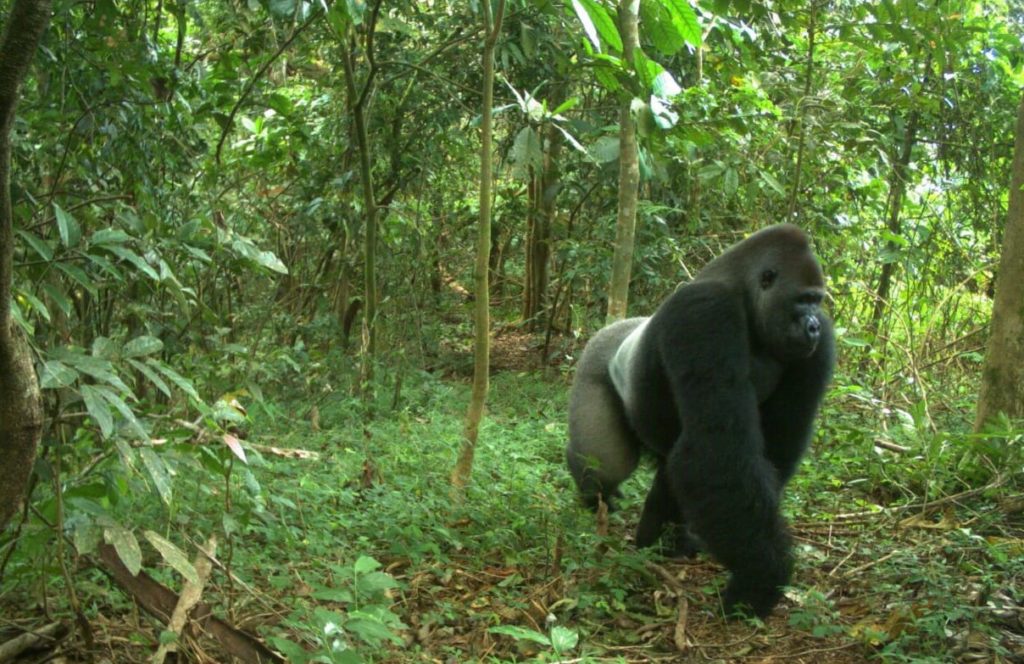WildAid, an organisation that focuses on reducing the demand for wildlife products, has launched a weeklong campaign to raise awareness about the threats facing Nigeria’s gorillas and to support Nigeria in protecting the remaining Cross River gorillas.

The campaign was launched on Saturday, September 24, 2022, as the world celebrated World Gorilla Day, a special moment dedicated to celebrating the world’s largest living primates.
The Cross River gorilla, which lives in the mountainous border area of Nigeria and Cameroon, is Africa’s most threatened ape, with a population estimated at fewer than 300 individuals.
Around 100 live in Nigeria and are found only in three protected areas across the Cross River state: Afi Mountain Wildlife Sanctuary, Mbe Mountains, and the Okwangwo division of Cross River National Park.
In the last two decades, illegal activities such as bushmeat hunting, logging, expansion of settlements, and agricultural encroachment are said to have destroyed their habitats, threatening the survival of the rare Cross River gorilla. Snares intended for other animals as bushmeat often trap Cross River gorillas, injuring or killing the great apes.
“Humans have pushed Cross River gorillas to the brink of extinction,” said Simon Denyer, Africa programme manager for WildAid. “The few who remain are scattered in small groups in rugged terrain, and any deaths or further habitat loss would threaten their very survival.”
“It is critically important to protect their remaining sanctuary and protect this important part of Nigeria and Cameroon’s natural heritage,” he added.
The Cross River gorilla has been listed in the International Union for Conservation of Nature (IUCN) Red List as Critically Endangered. The global population of gorillas stands at around 1,063, found in countries such as Nigeria, Rwanda, the Democratic Republic of Congo, and Uganda, which is home to over 50 percent of the gorilla’s global population.
Gorillas provide an important draw for Uganda’s tourism industry, which contributed 7.75% of its GDP and 6.7% of total national employment in 2018, according to research by the African Nature Based Tourism Platform. While Uganda makes millions of dollars annually in gorilla tourism and therefore garners more conservation efforts, Nigeria’s gorillas face extremely serious threats.
“It is not too late to save Nigeria’s remaining 100 Cross River gorillas, but we need to act now to protect them,” said Kelechukwu Iruoma, WildAid Nigeria Representative. “Individuals and communities need to be enlightened and sensitised on the need to protect our gorillas. We urge the Nigerian government to also update its wildlife laws to combat the threats facing our iconic gorillas.”
WildAid is also calling on all Nigerians to “Say No to Illegal Bushmeat”, as a way to ease some of those pressures on gorillas and other important species who are trapped and killed in snares set for bushmeat.
Facts about gorillas
Gorillas are one of the biggest and most powerful living primates. They weigh up to 180kg (almost 30 stone) and measure 170cm (over 5’5”) tall on all fours.
Gorillas live in family groups of around 10 individuals, with one dominant male. The male and females together take care of the infants while protecting them from danger.
Gorillas can live up to 40 years. Gorillas are classed as infants until they reach around three-and-a-half years old and are adults once they reach eight years.
WildAid’s campaign
In January of this year, WildAid launched a public awareness conservation campaign in Nigeria to highlight the illegal bushmeat trade and support enforcement activities to tackle the illegal wildlife trade.
The campaign uses the slogans “Say No to Illegal Bushmeat”, “Keep Them Wild, Keep Us Safe” and “Poaching Steals From Us All.”
The campaign includes TV public service announcements (PSAs), billboards, social media campaigns, and radio and TV programmes. Prominent “wildlife ambassadors” from music,
Nollywood, sports, religion, and entertainment have added their voices to the campaign, including Davido, Mayorkun, Laycon, Alex Iwobi, Henry Onyekuru, Stephanie Linus, Emanuella and Josh2funny.
WildAid has also developed partnerships with religious and conservation groups and has built robust media partnerships with over two-dozen broadcast, print and online organisations to amplify the campaign messages.
As part of the campaign, WildAid is committed to helping Nigeria strengthen the enforcement of its wildlife laws, forming partnerships with government agencies involved in enforcing both local and international wildlife regulations to create a unified approach to tackling the bushmeat crisis WildAid is currently working with the Lagos State Government to update its wildlife protection laws, as well as with Nigeria Customs Service and the National Environmental Standards and Regulations Enforcement Agency (NESREA) to support efforts to tackle the illegal wildlife trade and prevent the use of Nigerian ports and airports as transit hubs for wildlife trafficking.
